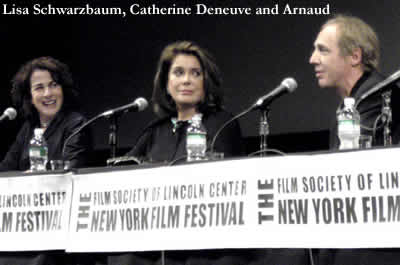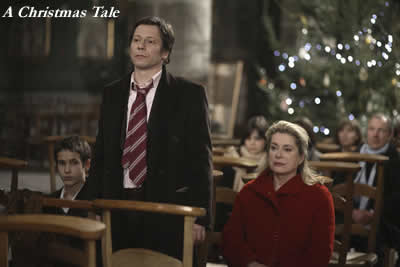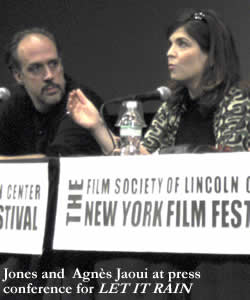In addition to presenting numerous films firmly rooted in reality, the 46th New York Film Festival also offered works focusing on family issues throughout different parts of the world .
French filmmaker Agnès Jaoui’s latest work, LET IT RAIN, talks about politics within society, in families and relationships and between friends. Co-written with Jean-Pierre Bacri, who also co-stars with Jaoui in the film, Let it Rain continues the pair’s writing-acting collaboration. Joui plays Agathe Villanova, a feminist writer turned politician visiting her family home town to spend some time with her sister and family but also to take part in a political rally. While visiting, she agrees to be interviewed by Karim (Jamel Debbouze), the son of her family’s ‘ Algerian housekeeper, and his journalist friend Michel (Bacri) for a documentary about successful women. Within this setting, Jaoui and Bacri
(with both humor and sincerity) address timely issues such as feminism, immigration, the current state of male and female emancipation. Most importantly the trio take the time to listen to one other to better understand each other’s points of view. LET IT RAIN will be released by IFC.
Another French movie focusing on one family and how globalization slowly erases its roots is Olivier Assayas’ SUMMER HOURS. Three siblings, Adrienne, Frederic and eremie (Juliette Binoche, Charles Berling and Jérémie Renier) living in New York, Paris and Shanghai respectively – have to decide what to do with their family home and art collection after their mother’s passing. Rather than showcasing a dramatic fight over the inheritance, Assayas shows this  family coming to a decision calmly and rationally. The siblings take each other’s current circumstances into account before agreeing to sell the house and art collection – two vital pillars of their family’s history. In one telling scene Frederic (Berling) and his wife visit his mother’s work desk – now a piece of the Museé D’Orsay’s permanent collection. Just a short while ago , this table was a well- used piece of furniture in a home , and now it has been transformed into a piece of art no longer meant to be touched.
family coming to a decision calmly and rationally. The siblings take each other’s current circumstances into account before agreeing to sell the house and art collection – two vital pillars of their family’s history. In one telling scene Frederic (Berling) and his wife visit his mother’s work desk – now a piece of the Museé D’Orsay’s permanent collection. Just a short while ago , this table was a well- used piece of furniture in a home , and now it has been transformed into a piece of art no longer meant to be touched.
The idea for this film materialized when the Museé D’Orsay approached Assayas and asked him to make a film utilizing the museum and its art collection. In the process Assayas was given unprecedented access to its art work and facilities. SUMMER HOURS will be released by IFC.
Staying in France, Arnaud Desplechin’s A CHRISTMAS TALE explores a strongly matriarchal family and how the husbands and sons arrange their lives around the women in them.. Catherine Deneuve is Junon, mother of three adult children and grandmother of three, who has been diagnosed with a rare form of cancer. Only a donor who is a perfetc match can potentially enable her to survive . Junon’s only two potential donors are her son Henri (Mathieu Amalric), who has been banished from the family by his sister Elisabeth (Anne Consigny), and her psychologically fragile grandson Paul (Emil Berling), Elisabeth’s son.  Upon Paul’s invitation, Henri shows up for the holidays. His arrival triggers the unveiling of some family secrets and spurs attempts at resolving them. Desplechin has assembled a beautiful ensemble cast, who deliver just the right amount of emotion for this many layered tale, which makes every minute of this family drama gratifying to watch. A Christmas Tale will be released by IFC
Upon Paul’s invitation, Henri shows up for the holidays. His arrival triggers the unveiling of some family secrets and spurs attempts at resolving them. Desplechin has assembled a beautiful ensemble cast, who deliver just the right amount of emotion for this many layered tale, which makes every minute of this family drama gratifying to watch. A Christmas Tale will be released by IFC
Moving on to Argentina and another film with a strong female lead- Lucrecia Martel’s latest work, HEADLESS WOMAN, is a quiet yet intense piece about Veronica (María Onetto) – a middle aged dentist struggling with guilt and grief after a hit-and-run accident. She never clearly acknowledges these feelings and simply continues with her daily life seemingly unaffected yet the audience can sense her inner turmoil. Martel dissects the turbulent conflict of her main character with a subtleness that quietly brings them to the attention of the audience. THE HEADLESS WOMAN is Martel’s third feature film and completes her trilogy of films pertaining to Salta, a region in Argentina where she grew up.
From Kazakhstan comes TULPAN by Sergey Dvortsevoy about living on the steppe – and how this harsh landscape shapes and influences family life. Ex-soldier Asa returns home dreaming to become a shepherd with his own herd. However, unless hemarries, this dream with will impossible to reach.. In this region unmarried women are rare – and Tulpan’s, only candidate rejects him.
Tulpan is a poetic work with gorgeous long shots of this singular landscape captured by Polish DP Jolanta Dylewska. Much of the film’s beauty and charm derive from its natural elements, such as the weather and animals.. As Dvortsevoy explained, once Dylewska and he started shooting some of the breathtaking footage of natural events, together with the reactions of the different animals, the focus of original story shifted slightly to accommodate such  beauty.. Dvortsevoy’s previous documentary work gave him the security and patience to know that spending additional time during production phase would allow him to capture the right moments for his film. At the end of the press
beauty.. Dvortsevoy’s previous documentary work gave him the security and patience to know that spending additional time during production phase would allow him to capture the right moments for his film. At the end of the press
| Text box |
conference, Dvortsevoy thanked all of his producers for their patience and generosity in letting him make the film he envisioned in the time that he needed.
Looking at family as a microcosm of society, TOKYO SONATA, by Japanese filmmaker Kiyoshi Kurosawa, tells the story of a seemingly content Tokyo middle class family.. However, once the father loses his job, and is too ashamed to tell his wife, this family slowly but surely falls apart. Kurosawa shows the devastating effects of non-communication on the entire family – between husband and wife, as well as parents and children. However, even though the situation seems irreversible, at the every end Kurosawa redeems his characters and we are left with a glimmer of hope – that this family may be able to save itself after all.
TOKYO STORY will be released by Regent Releasing.
 In addition to the film screenings of the main program as well as the sidebars, there were a number of talks and panels with guests of the festival: For the fourth year, HBO sponsored the popular HBO FILM DIALOGUES, a series of in-depth discussions between a filmmaker of the festival and a member of the NYFF 2008 selection committee. This year’s filmmakers were the China’s Jai Zhangke, Hong Kong’s Won Kar-Wai, Brooklyn’s Darren Aronofsky and Arnaud Desplechin from France. Taking their recent work at the festival as merely a starting point, the conversations spanned their entire body of work. Topics and themes included how they got started, what inspires them, who they work with, and how they approach their art. After these enlightening one-on-ones, the floor was opened to the audience for an extended q&a; session. Lasting around 90 min, these dialogues offer the audience valuable insight into the creative process of these exceptional artists. The elegant Kaplan Penthouse atop the Film Society’s offices provided a location that offers the right mix of casualness and concentration.
In addition to the film screenings of the main program as well as the sidebars, there were a number of talks and panels with guests of the festival: For the fourth year, HBO sponsored the popular HBO FILM DIALOGUES, a series of in-depth discussions between a filmmaker of the festival and a member of the NYFF 2008 selection committee. This year’s filmmakers were the China’s Jai Zhangke, Hong Kong’s Won Kar-Wai, Brooklyn’s Darren Aronofsky and Arnaud Desplechin from France. Taking their recent work at the festival as merely a starting point, the conversations spanned their entire body of work. Topics and themes included how they got started, what inspires them, who they work with, and how they approach their art. After these enlightening one-on-ones, the floor was opened to the audience for an extended q&a; session. Lasting around 90 min, these dialogues offer the audience valuable insight into the creative process of these exceptional artists. The elegant Kaplan Penthouse atop the Film Society’s offices provided a location that offers the right mix of casualness and concentration.
Overall, this year’s New York Film Festival was a visual feast filled with A-list festival highlights – and ensured that there is a lot to look forward to for the next weeks and months at a theater, TV station or video rental near you.

